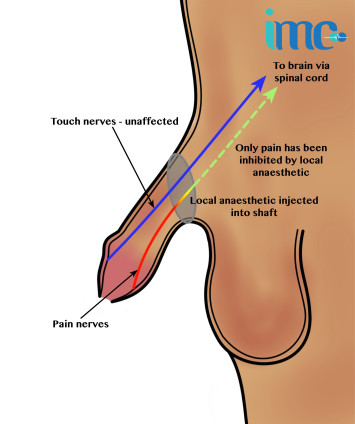Preparing your son for circumcision
Children's Submenu
Preparing your son for circumcision
This page discusses the minimisation of anxiety and the psychological effects of circumcision on children. Local anaesthetics that we use help to obtain a high level of pain relief, however “light touch”, a different form of sensation is still intact, so children will feel non-painful touch. How this sensation is interpreted can depend on the child’s level of anxiety. By reducing anxiety, children will not be upset by the light sensation they feel.

Local anaesthetic takes away the pain, but does not numb the area completely
For example, we have installed multimedia devices to engage children. We encourage parents to be calm during the procedure to promote a relaxed environment for your son. We have also developed this resource with the help of a child psychologist to aid parents in achieving the best experience possible for their son and the whole family. A calm child may actually enjoy the experience of meeting a friendly doctor, watching interesting television and being praised for how brave he has been as opposed to being apprehensive about an unfamiliar environment.
Dr. Sam Hackworth helped the IMC develop the following advice for parents to plan a strategy of preparing their son for circumcision.

For the very young child, no older than 6, I would recommend being very minimal in the explanation but also very specific. The reason is that this age group is prone to think in hugely black and white ways. To be very specific then, it would be most appropriate to say something like “the doctor will just take off the very tip of your [word of choice], almost like just when we trim your fingernails… it’s just a small part of it”. A major reason for the explanation in this way is this age group would tend to assume most or all of the penis is to be removed – unless they’re clearly told otherwise. For this age group, if possible, it can help to see the clinic and even staff beforehand so as to minimize anxiety about the unknown.
For the middle age boy group – around 7 to 10 or 11 – the brief simple explanation above also applies but they may ask more questions and need more details about the process and reason for it in order to cope better. Again, seeing the clinic and staff beforehand can help with coping.
Finally, for this age group, and the younger group too, something to be distracted by can help very much. So, if they clinic has a TV or movie the child can look at during the procedure, or can listen to music, that can help.
For the older group – essentially teens – the best preparation might be just to hear the explanation from the doctor or read the information provided by the clinic. Or, perhaps a proper explanation of it online – just be sure to read it first and make sure it is accurate. The main point is to be sure they know the realistic description of the procedure and are able to be more comfortable in the knowledge of what it is and what it is not. As you can expect, many or most, older boys would not particularly want to discuss this with mum or dad very much! But if they do have questions, just answer as simply and factually as possible, and see if that is sufficient or if they do need more information.
And, lastly, one very significant variable in how all age groups prepare for and cope with any medical procedure is how calm their parents remain before, during, and after!
With thanks to Dr. Sam Hackworth.

